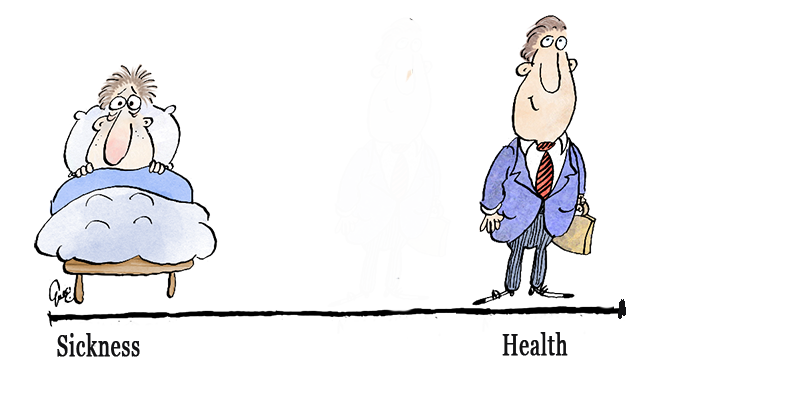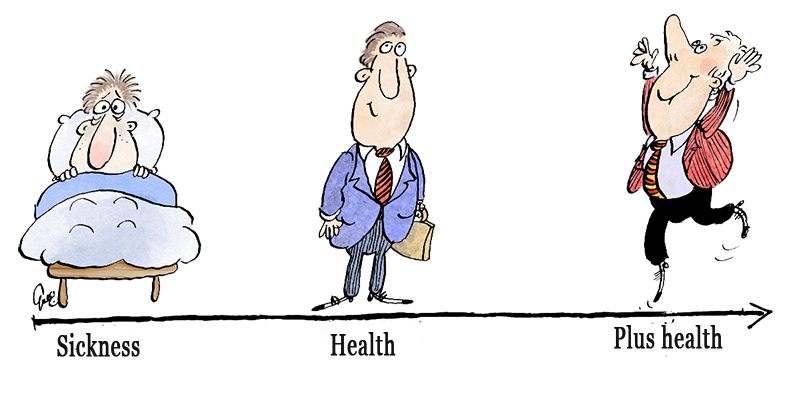Relaxation - a road to plus health
In 1996 I finished a study that included about two hundred people, who had taken relaxation-training courses with me. I was interested in, among other things, why people wanted to learn relaxation techniques and if they gained as much from it as they had expected. I also wanted to find out in what degree people who had learned to relax and enjoyed it, stopped training.
The answer to that question showed that as many as 60 % had gone on to practice relaxation on their own. It turned out that people tended to forget to practice relaxation once the most pressing problems were relieved. Once their ground level of tension was lowered to an acceptable level and life started to function fairly well, people stopped practicing. It was also easy to let go of their relaxation training when results didn’t appear immediately, or didn’t appear fast enough.
Be your own expert
I believe the reason is that we easily either neglect our responsibility for our health and well being, or turn it over to someone else. We are so used to letting so-called experts handle our problems that we often forget that it is, or should be, we ourselves who are the experts on our own bodies and our own well-being.
It is only when we understand that it is we ourselves, and no-one else, who are responsible for how we feel and what we do with our bodies, that we fully take responsibility, accept the consequences, and get interested in what we can do to feel better.
A lot of changes
The desire to get rid of stress, aches, pains, and/or sleep problems is the most common reason for people to start learning relaxation techniques. Over 90 % of the participants in my study felt they had reached the results they had hoped for with the help of relaxation.
After a while, 95 % noticed effects and changes in themselves from practicing relaxation. These changes included feeling better physically and mentally, better self-insight, increased sense of confidence, more even moods, increased inspiration to work, appreciation from friends and family that they are happier than before, more honest to themselves and others, speak their mind more clearly, take things easier, are more creative and their kids think they're nicer.
Long-term training pays
All participants filled in a stress test at three different intervals during the study. There was a big difference in stress level between those who had continued practicing relaxation compared to those who had quit after a while. This shows that we need continuity in our training in order to retain a low stress level and a state of well-being. Regular training over a longer period of time is what produces results in our quality of life.
Basic health and plus health
I believe it is necessary to change how we think. We need to change our attitude toward our own ability and responsibility to create change, to improve and develop within the realm of health.
I would like to introduce two concepts – basic health and plus health.
Imagine a horizontal line representing the total spectrum from sickness to health so that health is better the farther to the right you are. An early demise might be farthest to the left and just beside that might be some terminal illness or serious disability. Moving along to the right we might then find other diseases and handicaps and farther yet perhaps other symptoms such as aches and pains, low energy level, etc.

Even farther to the right we have the signs you might not even be aware of, but that a specialist might be able to discern. This could be a high count of white blood cells, or high cholesterol. Finally we reach a point along this line at which all illness, symptoms and signs have been eliminated. Is this health? Yes, many define health exactly so, and for most people the line ends here.
Set your health goal
This is a pity! If we simply assume that health is the absence of illness we will be ignoring everything that can be found along the continuation of the line, what we can call plus health. We would be setting our health goals at the null point instead of setting a goal of increasing daily health.

If we simply assume that health is the absence of illness we will be ignoring everything that can be found along the continuation of the line, what we can call plus health. We would be setting our health goals at the null point instead of setting a goal of increasing daily health. Often we don’t start caring about our health until we break down; it is only then that we are motivated enough to seek help or to do something ourselves. It would be more natural to set our goals to the far right (plus health) and constantly strive to develop toward better health and well-being.
Often we don’t start caring about our health until we break down; it is only then that we are motivated enough to seek help or to do something ourselves. It would be more natural to set our goals to the far right (plus health) and constantly strive to develop toward better health and well-being.
Good things start happening
Exploring the right side of our health spectrum, the plus health side, means we get rid of a lot of disturbances and we can make use of our full range of resources for a better part of the time. Relaxation is a road to plus health and my study shows that the longer relaxation training goes on, the more we can gain from it.
When symptoms such as aches, pains and sleep problems disappear, that is, we approach the null point of basic health, most people who continue relaxation training notice that other good things start happening. This is when plus health begins to have meaning.


 Stress test
Stress test

 Daily Affirmation
Daily Affirmation